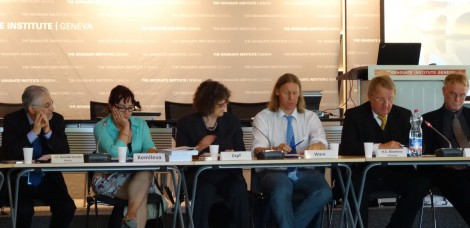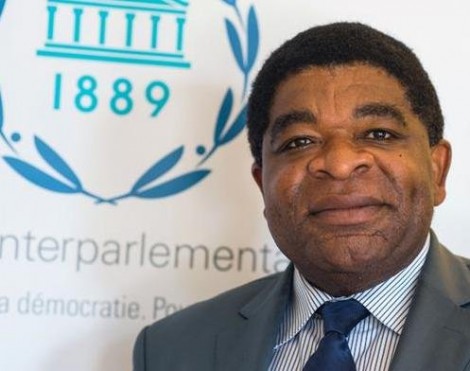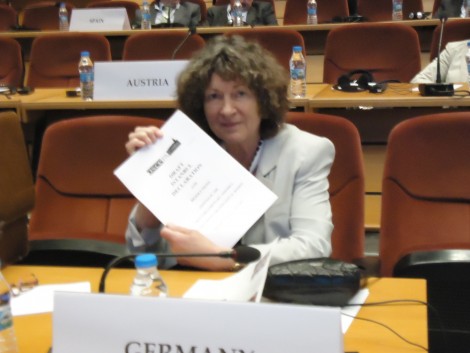On 8 September, representatives from twenty-one governments* joined a small group of disarmament experts and representatives of international organisations at a roundtable conference in Geneva to discuss key proposals and new initiatives for nuclear disarmament.
The event was organised by the Middle Powers Initiative (MPI), Parliamentarians for Nuclear Non-Proliferation and Disarmament (PNND), Basel Peace Office and Friedrich-Ebert-Stiftung Geneva Office as part of the Framework Forum – a process engaging governments in building the framework for a nuclear-weapon-free world. Previous Framework Forum roundtables have been organised in Vienna (May, 2012), New York (Oct, 2012), Berlin (Feb, 2013) and Geneva (August 2013).
The Sep 8 roundtable discussion involved a range of States, including some that possess nuclear weapons, some that are part of nuclear-security alliances, and some non-nuclear-weapon States (see * below for full list).
The discussions were initiated by some opening presentations and a briefing paper circulated prior to the event. See Middle Powers Initiative releases A Beacon of Hope!

Session 1: from left-to-right: Ambassador Raúl Heredia, Kamelia Kemileva, Uta Zapf, Ambassador Michael Biontiono and Prof Juergen Scheffran
A key theme explored in the briefing paper, and emphasised by a number of speakers, was that political conditions are never perfect for nuclear disarmament, but that this should not prevent the commencement of a negotiating process aiming for the complete elimination of nuclear weapons. Such a process could emerge from:
- the series of conferences on the humanitarian impacts of nuclear weapons, the next being held in December 2014 in Vienna;
- the UN Open-Ended Working Group (OEWG) on taking forward proposals for multilateral nuclear disarmament negotiations – or other similar UN-initiated process;
- the UN High-Level Conference on nuclear disarmament which the United Nations General Assembly has decided to hold prior to 2018;
- the 2015 NPT Review Conference;
- a high-level initiative by a few influential states independent of the above venues, in the way that the United States initiated the Nuclear Security Summits.
Martin Chungong, Secretary-General of the Inter Parliamentary Union, in a presentation Building political will and momentum for nuclear disarmament, highlighted the vital role that parliamentarians and parliaments have to advance national and global agendas for nuclear disarmament. In particular, parliaments influence government policy, decide on budget priorities, serve as elected representatives of civil society, and adopt measures to implement disarmament obligations. He noted the importance of parliamentary awareness of, and engagement in, multilateral forums such as at the United Nations and NPT.
Chungong reported on the landmark resolution adopted by the 130th Assembly of the IPU to support multilateral negotiations for a nuclear weapons convention (or package of agreements), eliminate the role of nuclear weapons in security doctrines and commemorate the International Day for the Total Elimination of Nuclear Weapons. The resolution is significant in that it was supported by all participating parliamentary delegations including those of nuclear weapon States and countries under extended nuclear deterrence relationships. (See also video prtesentation by Martin Chungong on IPU and the international day for nuclear abolition).

IPU Secretary-General Martin Chungong
Thore Vestby, representing Mayors for Peace, focused on the role that civil society and mayors can play in challenging the nuclear-weapon States. He highlighted the fact that cities – over 6000 of which have joined the Mayors for Peace campaign for a nuclear weapons convention – are becoming more linked together in a common desire for peace and cooperation. The policies of deterrence – i.e. threatening annihilation of cities with nuclear weapons – makes no sense in the inter-connected world of the 21st century. Cities can play an important role in bridging the conflicts (such as in Ukraine) and in building political will for nuclear abolition. (See Thore Vestby interview with UNFOLD ZERO following the Framework Forum).
Uta Zapf, PNND Special Representative for Inter Parliamentary Organisations, placed nuclear disarmament – both the difficulties and possibilities – in the context of the increased conflicts especially between Russia and the West over Ukraine. She reaffirmed the need for better diplomacy and less reliance on military force (and provocative military actions) in order to provide any possibility for progress on nuclear disarmament. As such, the cooperative security approach of the Organisation for Security and Cooperation and Europe (OSCE) is helpful and deserves better resourcing (personnel and financial) than it currently has. Her appraisal of NATO’s approach was more critical. She noted, for example, that NATO should not have cancelled the NATO-Russia Council discussions which could be more effective in assisting understanding and resolution of the conflict than the provocative NATO military actions.

Uta Zapf at the OSCE Parliamentary Assembly after the Assembly adopted her proposed text on nuclear disarmament
H.E. Michael Biontiono, Permanent Representative of Germany to the CD; outlined the Building Blocks Proposal which Germany submitted along with other countries (Australia, Belgium, Canada, Finland, Italy,
Japan, Netherlands, Poland, Portugal, Slovakia and Sweden) to the UN Open Ended Working Group on Taking Forward Multilateral Nuclear Disarmament Negotiations. The proposal provides a compromise between the step-by-step approach supported by the principal nuclear weapon States (France, Russia, UK and US) and their allies, and the more comprehensive approach favoured by China, India and most non-nuclear States. The Building Blocks approach calls for simultaneous work on many of the ‘steps’ or measures agreed in by nuclear weapon States, along with consideration of other ‘building blocks’ that would be required to achieve a nuclear-weapon-free world.
H.E. Raúl Heredia Acosta, Deputy Permanent Representative of Mexico to the UN, discussed the range of possible approaches to multilateral negotiations which were outlined in the New Agenda Coalition working paper to the 2014 Preparatory Committee Meeting for the 2015 NPT Review Conference. These included a nuclear weapons convention (or package of agreements), a framework convention, a ban treaty negotiated by like-minded countries, and a hybrid of these approaches.
Dr Scheffran, from the International Network of Engineers and Scientists for Global Responsibility, provided an illuminating scientific and logical approach to analysing the current situation, mapping solutions and then implementing these. His approach helped delegates think outside their country’s positions and political boxes. He emphasized the need to build bridges and integrate seemingly diverse concepts, such as nuclear non-proliferation and disarmament; nuclear ban and elimination; incremental and comprehensive approaches to nuclear abolition; merging technical and political solutions; building a verification system and establishing a security environment. The Nuclear Weapons Convention can serve as a framework and umbrella to integrate different building blocks and pathways towards a Nuclear-Weapon Free World.
Ivo Fung, United Nations Office of Disarmament Affairs, outlined the roles and value of the United Nations in the nuclear disarmament field, including the work of the UN Secretary-General, Open Ended Working Group, UNODA and UN Security Council. He encouraged governments and NGOs had to make better use of UN mechanisms and processes to facilitate nuclear disarmament negotiations and to address the security issues preventing progress.
Beatrice Fihn, International Campaign for the Abolition of Nuclear Weapons Executive Director, spoke about the primary purpose of the humanitarian consequences dimension to raise political will and empower all States (and civil society) to take action. She expressed the hope that the forthcoming Vienna Conference would help shift the agenda from discussing humanitarian consequences to commencing multilateral negotiations with the aim of the global prohibition and elimination of nuclear weapons. She noted that there are various options for such negotiations, including a like-minded ban-treaty. The key goal is not to argue over which is the best approach – but to start the negotiations.
Aaron Tovish, Mayors for Peace 2020 Vision Campaign Director, presented an action plan for governments and civil society for the next 4 years. The plan, outlined in the paper ‘Perfect Storm for a Breakthrough’, includes inter-connected work in multilateral forums leading up to and including the High Level Conference on Nuclear Disarmament, which the UN General Assembly decided to hold no later than 2018. The action plan puts forward forward realistic goals for current processes – such as the NPT Review Conference and a preparatory process for the High Level Conference. Tovish also put forward ideas on what type of agreement could be achieved at the High level conference – either a framework treaty, a universal prohibition on use, or a like-minded possession-ban treaty.
The ensuing discussion picked up on a number of the points raised by the speakers, with a primary focus on building the political will for nuclear disarmament. In this context, the establishment of September 26 as the International Day for the Total Elimination of Nuclear Weapons was welcomed. Plans by governments, parliaments and civil society to commemorate the day were outlined by a number of participants. UNFOLD ZERO has established a platform to specifically to promote the day and report on such actions and events.
There were a number of comments on the Building Blocks proposal, including which forum could best be used to develop the proposal further (Conference on Disarmament, NPT Review Conference, UN General Assembly, a revived Open Ended Working Group, or through the Framework Forum), and what additional building blocks being considered. On the latter question, it was suggested that it would be important to include concrete ‘building blocks’ on reducing the role of nuclear weapons at an early stage. These should include complete de-alerting, and agreements on no-first-use or non-use.
There were some comments on the importance of engaging the Security Council in order to advance the P5 process (agreed at the 2010 NPT Review Conference) and to support other steps and measures. Discussants recognised the difficulties in achieving consensus by the P5, but expressed optimism for possible action to follow-up UNSC resolution 1887 or to hold special non-resolution sessions on nuclear disarmament in 2015 during the final term of President Obama and with new non-permanent members joining in January.
In closing, PNND Coordinator Alyn Ware noted the value of bringing delegations and experts together in the Framework Forum informal process in order to explore possibilities to take forward multilateral negotiations and build political will and cooperation for success. PNND and MPI thus thanked the Friedrich-Ebert-Stiftung Geneva Office and Rissho Kosei-kai (Donate-a-Meal Fund for Peace) for their support for the series of Framework Forum roundtable events.
* Governments participating in the Framework Forum roundtable on 8 Sep 2014: Australia, Austria, Brazil, Canada, Chile, Czech Republic, Finland, France, Germany, Japan, Mexico, New Zealand, Pakistan, Poland, Slovakia, South Africa, South Korea, Sweden, Switzerland, Thailand, Turkey, United Kingdom.
Background documents:
Presentations and papers
- Building political will and momentum for nuclear disarmament, presentation by Martin Chungong, Secretary-General of the Inter Parliamentary Union;
- Perfect storm for a breakthrough, paper presented by Aaron Tovish, Mayors for Peace;
- From nuclear taboo to a prohibition (ban) on use: The next step to a nuclear-weapon-free world? Basel Peace Office food-for-thought paper;
- Making sense of abolition initiatives: Some key international civil society networks, campaigns and proposals for nuclear abolition;
- Verification and security of a Nuclear Weapons Convention, Juergen Scheffran, published in UNIDIR, Disarmament Digest, Verification and security in a nuclear-weapon-free world, 2010
Documents on the UN Open Ended Working Group
- Invitation from the UN Office of Disarmament Affairs to governments to submit views on Taking Forward Multilateral Nuclear Disarmament Negotiations by September 15 - English, Spanish, French
- Memo to governments from members of the Abolition 2000 Taskforce on the Open Ended Working Group recommending a renewal of the OEWG with specific tasks;
- Report of the UN Secretary-General on Taking Forward Multilateral Nuclear Disarmament Negotiations – UN Doc A/69/154, 17 July 2014;
